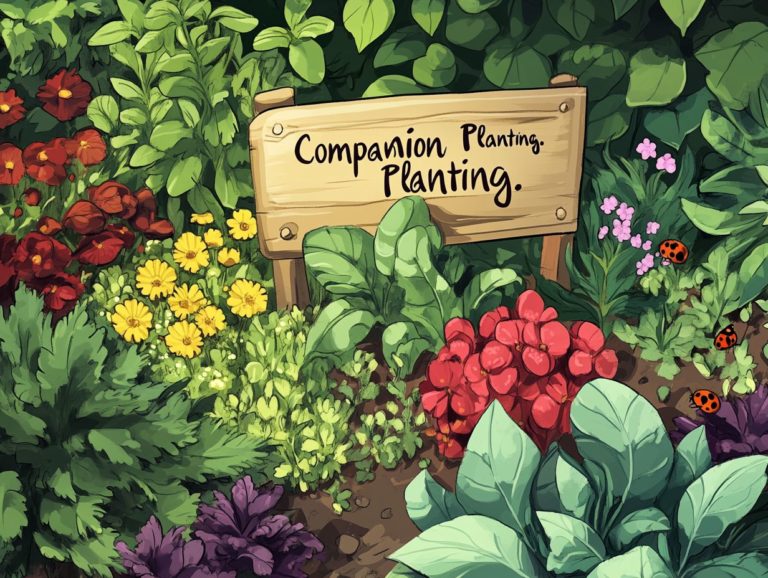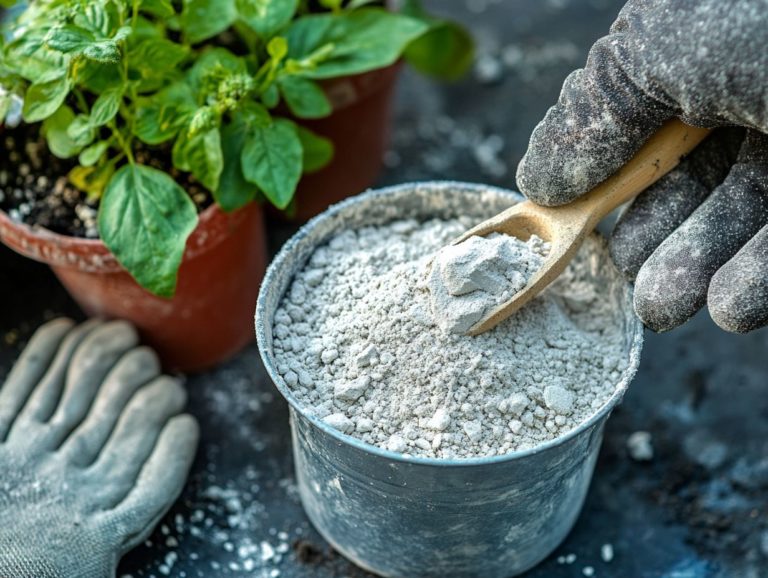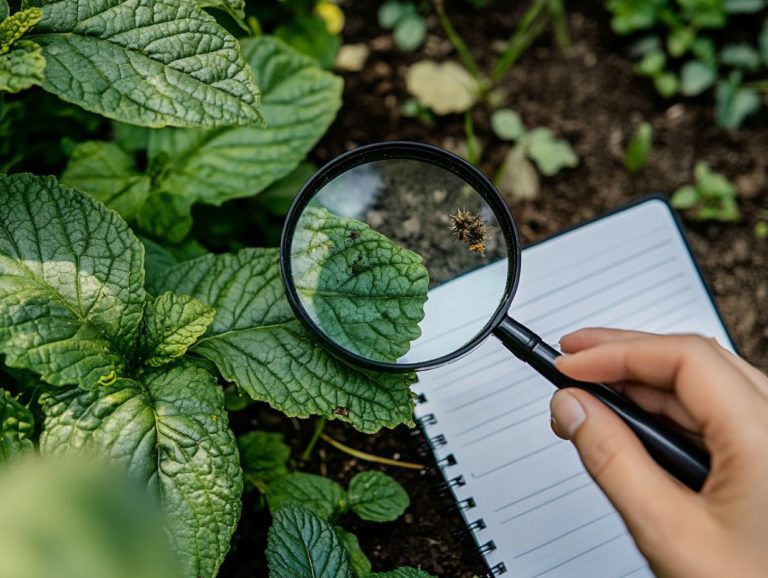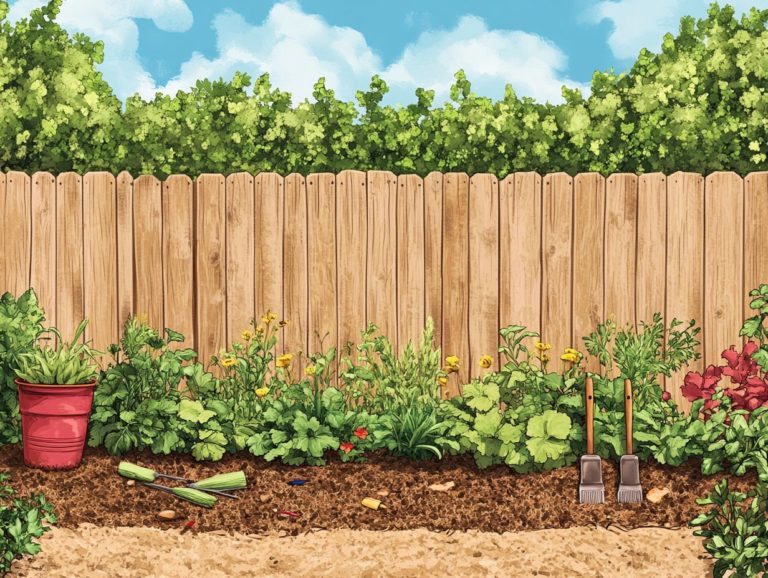When to Call an Exterminator for Garden Pests
Gardening can be an incredibly rewarding venture, yet it often presents unexpected challenges, particularly in the form of pests.
To truly thrive as a gardener, you must understand the types of pests that may invade your garden and recognize the signs of an infestation. This article will explore common garden pests, their behaviors, and provide practical DIY strategies for managing them successfully.
You ll also learn when it’s wise to enlist professional help and how to select the right exterminator, ensuring that your garden remains a flourishing sanctuary.
You will discover proactive techniques to prevent future infestations and keep your plants vibrant and healthy throughout the year.
Contents
- Key Takeaways:
- Understanding Garden Pests
- Signs of a Pest Infestation
- DIY Pest Control Methods
- When to Call an Exterminator
- Choosing the Right Exterminator
- Preventing Future Infestations
- Frequently Asked Questions
- When should I call an exterminator for garden pests?
- What types of garden pests should I call an exterminator for?
- How do I know if I have a pest infestation in my garden?
- Is it possible to control garden pests without calling an exterminator?
- What can I expect when I call an exterminator for garden pests?
- How can I prevent future pest infestations in my garden?
Key Takeaways:

- Know the common types of pests and their behaviors to better understand infestations.
- Look out for signs of a pest infestation such as damage and droppings.
- Call an exterminator when the infestation is severe or if DIY methods are not effective.
Understanding Garden Pests
Understanding garden pests is essential for cultivating a flourishing home garden in Texas. Common nuisances such as mosquitoes, sowbugs, snails, and caterpillars can wreak havoc on your plants. Recognizing these pests and their behaviors helps you use effective ways to control pests.
By identifying these pests, you can ensure your garden stays vibrant and productive. This not only enhances your gardening experience but also protects against any health issues that these pests might bring along.
Common Types of Pests and Their Behaviors
Common types of pests that plague your garden include mosquitoes, sowbugs, snails, and caterpillars. Each exhibits unique behaviors that can lead to significant infestations.
Take mosquitoes, for instance they’re not just annoying; they also pose health risks to both you and your pets. Sowbugs thrive in damp environments and feast on decaying organic matter that can impact your soil health.
Snails can wreak havoc on your tender seedlings and leafy greens, leaving behind unsightly holes in the foliage. Caterpillars, the larval stage of moths and butterflies, can decimate entire crops as they voraciously munch away at leaves, leading to substantial crop damage.
Knowing their life cycles can empower you to manage pests effectively. For example, introducing natural predators like birds or using row covers can help you mitigate these threats, ensuring your garden thrives without the interference of these common intruders.
Signs of a Pest Infestation
Identifying the signs of a pest infestation is essential for maintaining the health of your garden. Early detection can safeguard your plants and ensure the vitality of your vegetables and fruits.
Look out for common indicators such as visible damage to leaves, droppings, and the presence of adult pests like mosquitoes and caterpillars. By recognizing these signs, you can take swift action to protect your garden s flourishing ecosystem.
Identifying Damage and Other Indicators
To identify damage and other indicators of pest infestation, closely observe your plants for telltale signs like chewed leaves, discoloration, and stunted growth.
Pay attention to these symptoms to identify the exact pest causing the issue. For example, if you notice irregular holes in the leaves, it s likely the handiwork of caterpillars. A sticky residue on the stems could signal a mosquito issue.
Sowbugs often leave behind damp, decaying plant material, a clear hint of their presence, while snail trails reveal themselves through the shiny, silvery lines they create.
Recognizing these signs quickly is vital. Early detection gives you the power to implement effective control measures, ultimately shielding your green space from further damage. This ensures your plants thrive in vibrant health.
Start observing your garden today and take charge of pest management!
DIY Pest Control Methods
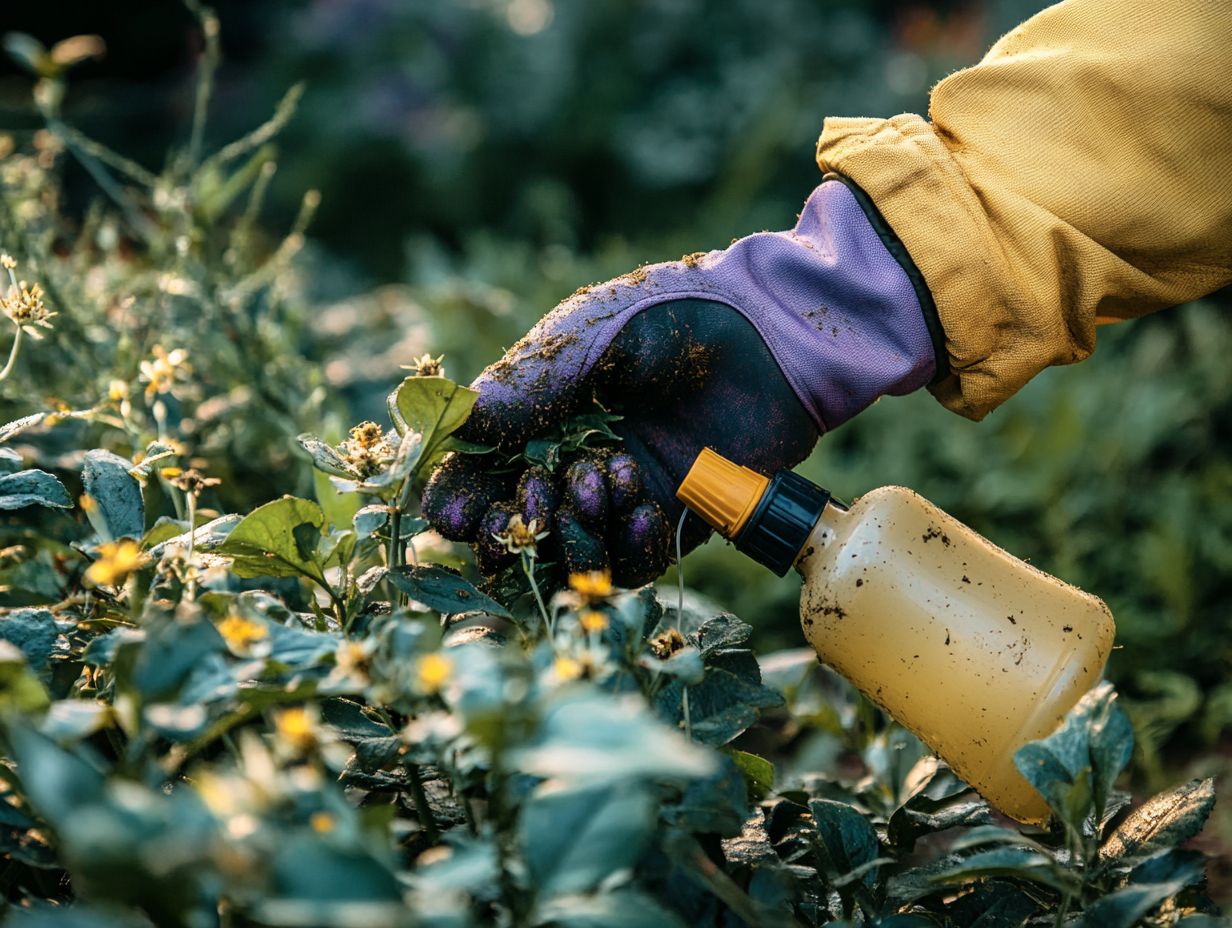
By implementing effective DIY pest control methods, you can tackle infestations while preserving the integrity of your organic soil and safeguarding beneficial insects.
With a range of natural solutions at your disposal think garlic sprays and essential oils alongside chemical alternatives, you have a wealth of options to address pesky invaders like mosquitoes and caterpillars, all without compromising your garden’s delicate ecosystem.
Natural and Chemical Solutions
Natural solutions like planting garlic, marigolds, and thyme can effectively deter pests. They protect beneficial insects, making them a superb choice for organic gardens.
While chemical solutions may deliver quicker results in the face of severe infestations, they often come with drawbacks. These eco-friendly methods not only nurture a thriving garden ecosystem but also minimize your reliance on harmful substances that can seep into the soil and waterways.
Essential oils, such as peppermint and lavender, can serve as effective repellents for those pesky insects when diluted and sprayed in your garden. Companion planting pairs crops to enhance growth and naturally repel pests.
On the other hand, while chemical pesticides may promise immediate pest elimination, their long-term use can foster resistance, disrupt ecological balance, and pose potential health risks to both humans and wildlife. Therefore, using natural pest control methods is better for your garden and the environment.
When to Call an Exterminator
Recognizing the right moment to summon an exterminator is crucial for effectively managing severe pest infestations that jeopardize your garden and may pose serious health risks to you and your family.
If your DIY efforts fall short and you observe extensive damage to your vegetables and fruits, it s time to seek the expertise of professionals who specialize in pest control.
Indicators of a Severe Infestation
Indicators of a severe infestation in your garden present themselves through extensive damage to plants, the visible presence of multiple pests like mosquitoes and caterpillars, and persistent health issues that compromise the ecosystem of your home garden.
You might notice signs such as wilting leaves, chewed stems, or discolored foliage, all pointing to the fact that your plants aren t thriving as they should. The constant buzzing of flies can create an unsettling atmosphere, detracting from the beauty of your green space.
If these problems persist, the situation escalates, potentially leading to crop failure or harmful effects on the nearby flora. Ignoring these troubling signs could result in a full-blown infestation, making recovery increasingly difficult.
Thus, it s essential to monitor your garden regularly. If pests overwhelm your garden, it’s time to take action! When symptoms become overwhelming or the pests multiply beyond your control, consider seeking professional help for effective eradication.
Benefits of Professional Pest Control
The advantages of professional pest control extend far beyond just eliminating pests. Exterminators offer expert assessments and customized strategies to prevent future infestations while also protecting the health of your garden.
With their extensive training and experience, these specialists can pinpoint the root causes of pest issues that may easily elude your untrained eye. They also have access to advanced tools and eco-friendly solutions that you might not find readily available, ensuring a more effective treatment.
Research indicates that homes utilizing professional pest control services experience significantly fewer pest-related problems over time. Testimonials from satisfied customers often highlight the peace of mind that comes from knowing their homes are safeguarded by experts committed to long-term management strategies, prioritizing preventative measures rather than merely reactive solutions.
Choosing the Right Exterminator
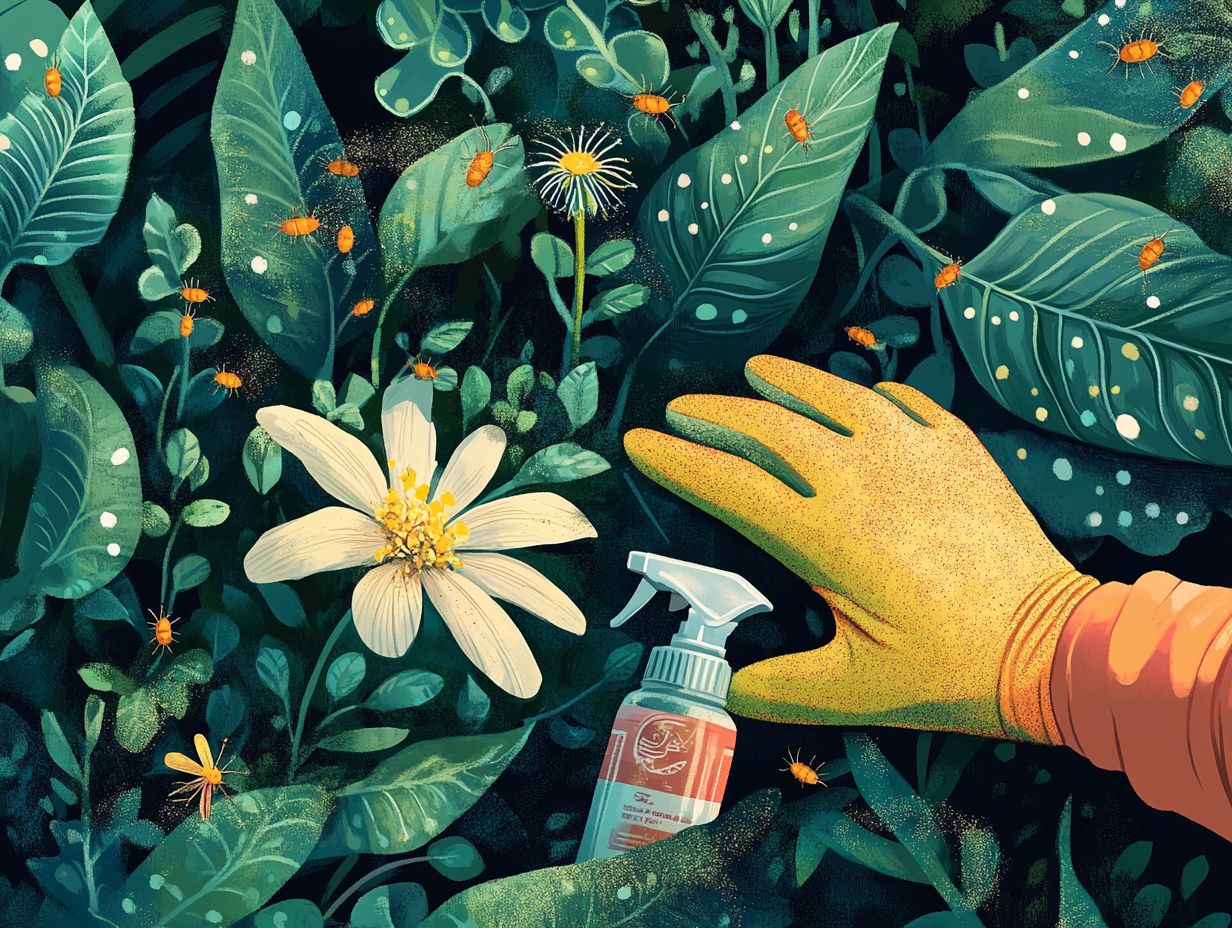
Selecting the right exterminator is essential for effective pest control, particularly in Texas. Unique pest challenges demand specialized approaches and seasoned professionals.
Think about crucial factors, like experience and methods, to find the right exterminator for your needs!
Consider customer reviews as well. This careful evaluation ensures that your home garden receives the care it deserves for effective pest management.
Factors to Consider
When selecting an exterminator, consider several critical factors. Look at their experience, the variety of services they offer, and how they handle pests whether they use chemical methods or environmentally friendly alternatives.
These elements are vital for ensuring that your pest issue is resolved effectively and safely.
To assess an exterminator s qualifications, delve into their certifications, training, and years of hands-on experience. Understanding their methodology is essential; it sheds light on their problem-solving techniques and their dedication to health and safety standards.
Customer satisfaction levels provide valuable insight into the quality of their services. By reading reviews and testimonials, you can gauge the exterminator s effectiveness and reliability, making your selection process smoother and more informed.
Preventing Future Infestations
To prevent future infestations in your garden, adopt a proactive approach. Utilize effective strategies and tips that promote a healthy ecosystem while protecting your organic soil and nurturing beneficial insects.
By implementing simple practices, you can significantly diminish the chances of pest problems. This ensures that your vegetables and fruits flourish in a pest-free environment.
Effective Strategies and Tips
Effective pest prevention strategies include regularly inspecting your plants and embracing companion planting with beneficial insects.
Nurturing healthy organic soil naturally deters pests. By cultivating a diverse garden ecosystem, you can attract natural predators like ladybugs and lacewings, who help control pest populations without chemical solutions.
Incorporating practices such as crop rotation changing the type of plants grown in an area to keep pests confused and organic mulch boosts soil health and disrupts pest life cycles.
Understanding the life stages of common pests enables you to implement targeted management strategies. This allows you to address potential infestations before they spiral out of control.
By adopting these holistic approaches, you contribute to a more sustainable and resilient garden environment, fostering not just plant health but also enhancing biodiversity.
Frequently Asked Questions
Here are some common questions about garden pest control:
When should I call an exterminator for garden pests?

You should call an exterminator when you notice a significant infestation that you cannot control on your own.
What types of garden pests should I call an exterminator for?
You should call an exterminator for any garden pest that is damaging your plants or posing a threat to your health.
How do I know if I have a pest infestation in my garden?
You may have a pest infestation if you notice signs of damage, like chewed leaves or wilting plants, or if you see a large number of pests.
Is it possible to control garden pests without calling an exterminator?
In some cases, it is possible to control garden pests without an exterminator. However, if the infestation is severe, it s best to seek professional help.
What can I expect when I call an exterminator for garden pests?
An exterminator will assess the extent of the infestation and determine the best course of action. They may use pesticides or other methods to eliminate the pests.
How can I prevent future pest infestations in my garden?
To prevent future infestations, practice good gardening habits, such as keeping your garden clean and free of debris, and regularly inspecting your plants for signs of pests.
Ready to reclaim your garden? Contact an exterminator today!

